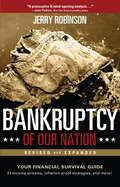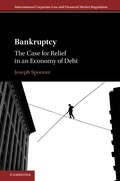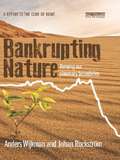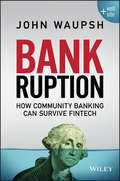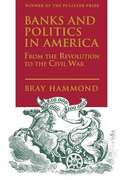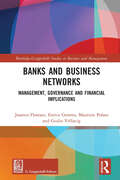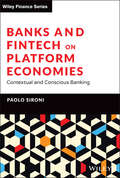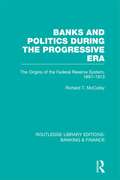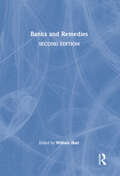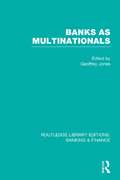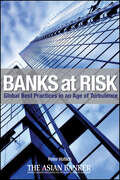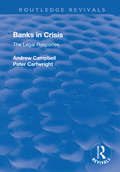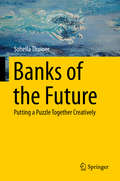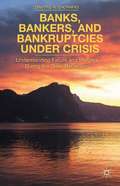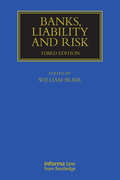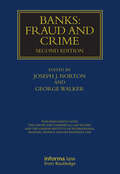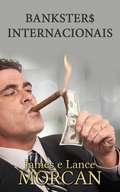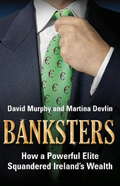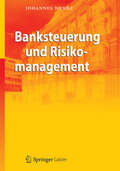- Table View
- List View
Bankruptcy of Our Nation (Revised and Expanded): Your Financial Survival Guide
by Jerry Robinson"It's no secret that the U.S. national debt is in the tens of trillions. But did you know that America also has future unfunded obligations of over $118 trillion? Unfortunately, America's politicians have no plan to solve our mounting fiscal and monetary crisis. But you don't have to watch this unfold in fear of your financial future. The time for debate is over... It's time to prepare! In this revised and expanded release of Bankruptcy of Our Nation, Jerry Robinson offers you the ultimate financial survival guide. Robinson, an Austrian economist, columnist, and radio host, is featured weekly on Worldnetdaily.com, quoted by USA Today, has appeared on Fox News, and has written columns for Townhall and FinancialSense. Allow him to guide you with details of the 21 income streams you can create now and in retirement Specific ways to inflation-proof your investment portfolio using the P.A.C.E. (Precious Metals, Agriculture, Commodities, and Energy) Method How to create a diversified six-month liquid savings reserve that uses stable foreign currencies and precious metals. And the 5 Levels of Financial Freedom that Jerry has personally used to build true wealth and create complete financial security. You can survive this economic crisis, but you can't wait. It's time to take action. Let this book show you how to become a better investor and create multiple streams of income."
Bankruptcy: A Debtor's Perspective
by Michael J. Roberts Howard H. StevensonDescribes the business and legal context surrounding personal and corporate bankruptcy.
Bankruptcy: The Case for Relief in an Economy of Debt (International Corporate Law and Financial Market Regulation)
by Joseph SpoonerA decade after the Global Financial Crisis and Great Recession, developed economies continue to struggle under excessive household debt. While exacerbating inequality and political unrest, this debt - when combined with wage stagnation and a shrinking welfare state - has played a key role in maintaining economic growth and allowing households faced with rising costs of living to make ends meet. In Bankruptcy: The Case for Relief in an Economy of Debt, Joseph Spooner examines this economic model and finds it increasingly unsustainable. In a call to action to reduce debt burden, he turns to bankruptcy law, which is uniquely situated as a mechanism of social insurance against the risks of a debt-dependent economy. This book should be read by anyone interested in understanding the problem of consumer debt and how best to address it.
Bankrupting Nature: Denying Our Planetary Boundaries
by Johan Rockström Anders WijkmanThis powerful book shows us that we are in deep denial about the magnitude of the global environmental challenges and resource constraints facing the world. Despite growing scientific consensus on major environmental threats as well as resource depletion, societies are largely continuing with business as usual, at best attempting to tinker at the margins of the problems. The authors argue that regardless of whether governments respond to the economic crisis through additional stimulus packages or reduced government spending, environmental and resource constraints will remain. The crisis will be exacerbated by the combination of climate change, ecosystem decline and resource scarcity, in particular crude oil. The concept of Planetary Boundaries is introduced as a powerful explanation of the limits of the biosphere to sustain continued conventional growth. The book breaks the long silence on population, criticizing donor countries for not doing enough to support the education of girls and reproductive health services. It is shown that an economy built on the continuous expansion of material consumption is not sustainable. De-growth, however, is no solution either. The growth dilemma can only be addressed through a transformation of the economic system. A strong plea is made for abandoning GDP growth as the key objective for development. The focus should instead be on a limited number of welfare indicators. The trickle-down concept is seriously questioned, to be replaced by one of sufficiency. Rich countries are called upon to hold back their material growth to leave room for a rising living standard among the poor. Alternative business models are presented, such as moving from products to services or towards a circular economy based on re-use, reconditioning and recylcing – all with the aim of facilitating sustainable development. A Report to the Club of Rome
Bankruption: How Community Banking Can Survive Fintech
by John WaupshCommunity banking can flourish in the face of fintech and global competition with a fresh approach to strategy Bankruption + Website offers a survival guide for community banks and credit unions searching for relevance amidst immense global competition and fintech startups. Author John Waupsh is the Chief Innovation Officer at Kasasa, where he helps spearhead financial product development and implementation across hundreds of institutions. In this guide, he draws on more than a decade in the industry to offer clear, practical advice for competing with the megabanks, direct banks, non-banks, and financial technology companies. The discussion separates futurist thinking from today's realities, and dispels common myths surrounding the U.S. community banking model in order to shed light on the real challenges facing community banking institutions. It follows with clear solutions, proven strategies, and insight from experts across banking and fintech. All arguments are backed by massive amounts of data, and the companion website provides presentation-ready visualizations to help you kickstart change within your team. In the U.S. and around the globe, fintech companies and non-banks alike are creating streams of banking services that are interesting, elegant, and refreshing--and they're winning the hearts and minds of early adopters. Not a one-size-fits-all approach, this book offers many different tactics for community banks and credit unions to compete and flourish in the new world. Analyze fintech's threat to the community banking model Learn where community banking must improve to compete Disprove the myths to uncover the real challenges banks face Adopt proven strategies to bring your organization into the future Community banks and credit unions were once the go-to institutions for local relationship banking, but their asset share has been on the decline for three decades as the big banks just got bigger. Now, fintech companies are exploiting inefficiencies in the traditional banking model to streamline service and draw even more market share, as community banking executives are left at a loss for fresh tactics and forward-looking strategy. Bankruption + Website shows how community banks can be saved, and provides a proven path to success.
Banks And Politics In America: From The Revolution To The Civil War
by Bray HammondThis is a book about politics and banks and history. Yet politicians who read it will see that the author is not a politician, bankers who read it will see that he is not a banker, and historians that he is not an historian. Economists will see that he is not an economist and lawyers that he is not a lawyer. <p><p> With this rather cryptic and exhaustive disclaimer, Bray Hammond began his classic investigation into the role of banking in the formation of American society. Hammond, who was assistant secretary of the Board of Governors of the Federal Reserve System from 1944 to 1950, presented in this 771-page book the definitive account of how banking evolved in the United States in the context of the nation's political and social development. <p> Hammond combined political with financial analysis, highlighting not only the influence politicians exercised over banking but also how banking drove political interests and created political coalitions. He captured the entrepreneurial, expansive, risk-taking spirit of the United States from earliest days and then showed how that spirit sometimes undermined sound banking institutions. In Hammond's view, we need central banks to keep the economy on an even keel. Historian Richard Sylla judged the work to be "a wry and urbane study of early U.S. financial history, but also a timeless essay on how Americans became what they are." Banks and Politics in America won the Pulitzer Prize for history in 1958.
Banks and Business Networks: Management, Governance and Financial Implications (Routledge-Giappichelli Studies in Business and Management)
by Josanco Floreani Maurizio Polato Enrico Geretto Giulio VelliscigWhile there is a vast amount of literature examining firm’s networks from an industrial organization perspective, the financial implications of networking remain underexplored. This book fills this gap, by investigating the phenomenon of business networks in the context of management and governance processes, and the related effects on interactions with the financial system in general, and credit institutions in particular. Networking is examined both from the demand (firms) and supply (banking institutions) perspective, thus, the book offers several contributions. It outlines the critical issues connected to business aggregations from the point of view of the management of information flows, and addresses the problem of identifying the role of banking ecosystems, in light of the transformations taking place in the financial industry, considering the growing complementarity between bank and market instruments in corporate financing. It explores the problem of identifying rating models for business networks, as well as, for individual participants on a stand-alone basis. Further, the book analyses a sample of networks in Friuli-Venezia Giulia and profiles a number of specific business cases. The book will be of particular interest to researchers and scholars in the field of banking and finance but also entrepreneurship and small business management. It will also find an audience among scholars from a wide array of additional fields, working on the relationship between financing concerns and growth opportunities.
Banks and Fintech on Platform Economies: Contextual and Conscious Banking (The Wiley Finance Series)
by Paolo SironiDiscover the future of the financial services industry with this insightful new resource on Contextual and Conscious Banking In Banks and Fintech on Platform Economies: Contextual and Conscious Banking, accomplished fintech professional and author Paolo Sironi delivers an insightful examination of how platform theory, born outside of financial services, will make its way inside banking and financial markets to radically transform the way firms do business. You’ll learn why the financial services industry must master the necessary shift of focus from selling business outputs to selling client outcomes. You’ll also discover how to steer the industry towards new forms of digital transformation underpinned by Contextual Banking and Conscious Banking platform strategies that will benefit stakeholders of all kinds. This important book: Describes the shift in mindset necessary to help banks strengthen and extend the reach of their Banking-as-a-Service and Banking-as-a-Platform operations. Shows how a renewed interpretation of fundamental uncertainty inspires the usage of exponential technologies to achieve architectural resilience, and open the reference theory to spring new business models centered on clients’ and ecosystems’ antifragility. Financial services industry can break-out from a narrow space of value-generation to reclaim top spot against bigtech contenders, enjoying greater flexibility and adaptability at lower digital costs Perfect for CEOs, business leaders, regulators, fintech entrepreneurs, wealth managers, behavioral finance researchers and professionals working at financial technology companies, Banks and Fintech on Platform Economieswill also earn a place in the libraries of bankers seeking a firm grasp of the rapidly evolving outcome economy and a view about the future of the industry.
Banks and Labor as Stakeholders: Impact on Economic Performance
by Kenichi Ueda Stijn ClaessensA report from the International Monetary Fund.
Banks and Politics During the Progressive Era (Routledge Library Editions: Banking & Finance)
by Richard T McCulleyDespite the political potency of money and banking issues, historians have largely dismissed the Progressive Era political debate over banking as irrelevant and have been preoccupied with explaining the shortcomings, limitations and inadequacies of the Federal Reserve Act. The picture that has emerged is one of bankers controlling the course of financial reform with the assistance of political leaders who were either subservient, hopelessly naive or insincere in their public opposition to bankers. This book places their exertions in a larger, unfolding political context and traces in an analytical narrative the interplay of sectional and economic interests, political ideologies and partisan clashes that shaped the course of banking reform.
Banks and Remedies
by William Blair QcThis text looks at the options that the law provides, both domestically and internationally. It also explains the various opportunities available to reduce risk and organize and administer rescue packages for ailing institutions. This edition addresses the new civil procedures rules in England; arbitration in banking and finance; rescues; EC remedies and English law remedies.
Banks as Multinationals (Routledge Library Editions: Banking & Finance)
by Geoffrey JonesThis comparative, international study looks at origins and business strategies of multinational banks. A distinguished team of bankers and academics from the United States, Japan, Europe and Australia survey the evolution of multinational banks over time and suggest a conceptual framework in which this development can be understood. In-depth analyses of the multinational banking strategies of selected countries and institutions lead from early nineteenth century on to late twentieth century developments and future trends in investment banking. The approach is interdisciplinary, with economists and business historians joining together to confront theory with facts. The findings presented in this major study will be of interest to scholars and professionals in international business, banking and finance, economists and business and economic historians.
Banks at Risk
by Peter HoflichIdeas on how to reform the financial services industry, from experts on the inside In the wake of the financial crisis of 2008 the practices of the entire global financial services industry have been called into question. From the government, to the media, to the general public, everyone is re-thinking the way forward for the financial sector, but the stakes are high. Should negative trends in the industry continue and financial innovations allow fallout from the next crisis to grow exponentially, the endgame could be the sort of mutually assured destruction that topples entire economies. Charting the way forward for financial services reform requires a fundamental reappraisal of how things are done in order to avert disaster in the near future, and Banks at Risk: Global Best Practices in an Age of Turbulence explores what the future holds, by talking to experts in the know. Compiling the insights of ten key figures in the financial services industry--regulators, commercial bankers, risk managers, and infrastructure specialists--who look at both strategic and operational issues in their assessments of how to clean up the industry and move towards a system of properly-managed risk, the book explores exactly what we need to do to prevent another crisis. Sharing their thoughts for the first time are Liu Mingkang, the Chairman of the China Banking Regulatory Commission; Eric Rosengren, President of the Federal Reserve Bank of Boston; Joel Werkama, Assistant Vice President of the Federal Reserve Bank of Boston; Jane Diplock, former chairperson of the International Organization of Securities Commissions and the former head of New Zealand's securities commission; Jose Maria Roldan, head of the banking supervision at the Bank of Spain; Jesus Saurina, Director of the Financial Stability Department at the Bank of Spain; Dick Kovacevich, former chairman and CEO of Wells Fargo Bank; Mike Smith, CEO of ANZ Group and former head of HSBC's Asia Pacific operations; Shan Weijian, Chairman and CEO of Pacific Alliance Group and former senior partner of TPG Capital; Rob Close, former CEO of CLS Group; Tham Ming Soong, Chief Risk Officer at the United Overseas Bank in Singapore; and Tsuyoshi Oyama, former head of the risk assessment division in the international affairs division of the Bank of Japan. Takes a unique look at the problems with the financial services industry and what can be done to fix them Brings together ideas for reform from numerous internationally respected figures working in the industry, many of them writing about their solutions for the first time Offers a remarkable insight into how to build a more sustainable future Eminently thought provoking, Banks at Risk presents real solutions to reforming the financial services industry, from the men and women who know it best.
Banks in Crisis: The Legal Response (Routledge Revivals)
by Andrew Campbell Peter CartwrightThis title was first published in 2002: A detailed and critical analysis of the various legal problems that arise when banks are in serious financial difficulty, Banks in Crisis offers an invaluable, international perspective on the concept and causes of bank failure. It takes an authoritative and much-needed look at a number of key issues including: - Effective bank regulation as an instrument in the possible prevention of banking crises, with particular reference to the role of the Financial Services Authority in the UK, and the impact of the Financial Services and Markets Act 2000 - The role of the Bank of England in the new regulatory landscape, with particular reference to its function as lender of last resort - The legal controls on those involved in the management of banks - Insolvency procedures and bank liquidation - The use of depositor protection schemes. By drawing conclusions and weighing up the methods available to promote stability, prevent failure and promote rescues where appropriate, Banks in Crisis is an essential read and a welcome addition to this crucial area of research.
Banks of the Future: Putting a Puzzle Together Creatively
by Sohella ThuinerThis book will guide financial institutions in developing new approaches and solutions for handling perennial issues. Emphasizing the value of creativity for project management in the banking sector, the author provides new insights for all those working in banking and finance. Presenting a number of new, outside-the-box ideas, the book can be regarded as the missing spice that will creatively transform all other ingredients in the monetary world.
Banks, Bankers, and Bankruptcies under Crisis
by Dimitris N. ChorafasBanks, Bankers, and Bankruptcies Under Crisis uses case studies of failed banks, banks that would have failed without taxpayer intervention, and in some cases banks obliged to merge under government pressure, to better understand global banking today.
Banks, Liability and Risk
by William Blair QcBanks, Liability and Risk, 3rd Edition, is a probing look at the risks faced by banks and other lending institutions, showing problems typically faced by these institutions and highlighting the legal remedies available, with copious references to case law and precedents. The nature of the risks and liabilities which banks are exposed to are continually changing. This new edition has been completely revised to incorporate these changes, so that you can provide your clients and colleagues with the most up-to-date advice.
Banks: Fraud And Crime (International Banking, Finance And Economic Law Series Set Ser.)
by Joseph J. Norton George A. WalkerBanks: Fraud and Crime explores the main issues which arise in bank fraud world-wide and looks at the possible options available for corrective action. A series of leading commentators examine the basic nature of bank fraud and financial crime, comparing the legal and regulatory framework in England to those in place in the USA and elsewhere. Banks: Fraud and Crime also takes a detailed look at the core issue of money laundering at a national, regional and international level as well as considering the many other complex issues arising from bank fraud and financial crime.
Bankster$ Internacionais
by James Morcan Lance Morcan Wesley LindquistBankster$ Internacionais identifica quem são os responsáveis pelos gigantescos golpes financeiros que separam os 1% superiores da população, quanto à renda, das pessoas comuns, ou os 99%. Os Barões do Dinheiro focalizados neste livro incluem os administradores dos mais altos níveis nos bancos de Wall Street, nos bancos centrais europeus, na Reserva Federal dos EUA e no Banco do Vaticano, bem como os membros das dinastias bancárias de elite, por exemplo as famílias Rothschild e Rockefeller. Bankster$ Internacionais revela os verdadeiros motivos da série de crises financeiras recentes. Esses motivos incluem: o mundo secreto do "black money" e do dinheiro do Velho Mundo onde a maioria dos ativos e renda permanece não declarada; o sistema dos bancos centrais e a verdadeira natureza da Reserva Federal, dos EUA; as atividades financeiras menos do que santas do Vaticano; as relações nem sempre benevolentes do FMI e do Banco Mundial com os países do Terceiro Mundo; as medidas de austeridade atualmente infligidas a nações vulneráveis como a Grécia; bem como a teoria de que o suprimento de dinheiro do mundo está essencialmente sendo criado do nada. Além de identificar problemas e expor a corrupção, Bankster$ Internacionais propõe ideias para criar um sistema econômico mais justo. Essas idéias incluem: criar bancos públicos; utilizar certos aspectos da banca islâmica que podem ser compatíveis com os sistemas bancários ocidentais; estudar se o capitalismo e o socialismo podem realmente funcionar em conjunto; discutir o caso de manter, mas reestruturar o capitalismo; considerar os méritos de uma renda universal; e prever a influência do ciber-dinheiro, ou criptomoedas, na economia mundial nos próximos anos. Embora os assuntos abordados possam ser problemas monetários, isso está na superfície ...
Banksters
by David Murphy Martina Devlin1929... On Wall Street, during the worst financial crisis the world had ever seen, the word "Banksters" was coined to describe those ruthless individuals who had gambled away the country's wealth.2009... The phrase "Banksters" is resurrected as David Murphy and Martina Devlin describe the shocking story of how the Irish banking system was brought to its knees by a corrupt elite driven by profit and greed.Banksters examines the events which triggered the near collapse of Ireland's banking system, when it unfolded that a privileged 'golden circle', caught up in a frenzy of greed and opportunism, had gambled and lost with the deposits and pensions of the Irish people.It charts how an unprecedented orgy of over-borrowing - fuelled by bankers who threw out the rule book on lending and reckless tax breaks from cavalier politicians -caused a massively over-inflated property bubble. While bank shares climbed to dizzying heights, profits soared and executives earned enormous bonuses, those who cried 'stop!' were shouted down. But there was no promised 'soft landing' when, in September 2008, bankers overnight went from being pillars of society to pariahs. When the word 'Ireland' became synonymous with corruption in the global lending markets. When a generation learned it would pay a high price for the arrogance and greed of its business elite.Banksters is a hard-hitting read that, were it fiction, might not be believed. In describing the key players, their motivations, personalities and lavish lifestyles it poses the all-important questions: who is answerable - and will all the culprits be called to account?
Banksters
by David Murphy Martina Devlin1929... On Wall Street, during the worst financial crisis the world had ever seen, the word "Banksters" was coined to describe those ruthless individuals who had gambled away the country's wealth.2009... The phrase "Banksters" is resurrected as David Murphy and Martina Devlin describe the shocking story of how the Irish banking system was brought to its knees by a corrupt elite driven by profit and greed.Banksters examines the events which triggered the near collapse of Ireland's banking system, when it unfolded that a privileged 'golden circle', caught up in a frenzy of greed and opportunism, had gambled and lost with the deposits and pensions of the Irish people.It charts how an unprecedented orgy of over-borrowing - fuelled by bankers who threw out the rule book on lending and reckless tax breaks from cavalier politicians -caused a massively over-inflated property bubble. While bank shares climbed to dizzying heights, profits soared and executives earned enormous bonuses, those who cried 'stop!' were shouted down. But there was no promised 'soft landing' when, in September 2008, bankers overnight went from being pillars of society to pariahs. When the word 'Ireland' became synonymous with corruption in the global lending markets. When a generation learned it would pay a high price for the arrogance and greed of its business elite.Banksters is a hard-hitting read that, were it fiction, might not be believed. In describing the key players, their motivations, personalities and lavish lifestyles it poses the all-important questions: who is answerable - and will all the culprits be called to account?
Banksteuerung und Risikomanagement
by Johannes WernzStrategieplanung und ihre Instrumente sind essentiell für die Gesamtsteuerung von Banken. In dem Band werden fortgeschrittene Verfahren für das Risikomanagement in allen Bankbereichen umfassend dargestellt. Dazu gehören detaillierte Szenarien ebenso wie fortgeschrittene Konzepte für das Kreditrisiko. Gesamtwirtschaftliche und regulatorische Entwicklungen werden nicht nur analysiert, auch Handlungsoptionen werden aufgezeigt. Der Band bietet zudem spannende Hintergrundinformation, internationale Vergleiche sowie viele anschauliche Beispiele.
Bankvyavsayachi Multatve-1 First Semester FYB.COM New NEP Syllabus - SPPU: बँकव्यवसायाची मूलतत्त्वे-१ प्रथम सत्र एफ.वाय.बी.कॉम नवीन एन.इ.पी. अभ्यासक्रम - सावित्रीबाई फुले पुणे यूनिवर्सिटी
by Dr D. G. Ushir Dr S. R. Javale Dr R. K. Datir Dr S. V. Patil‘बँकव्यवसायाची मूलतत्त्वे-1’ हे पुस्तक बँकिंगच्या संकल्पना, त्याचा इतिहास, कार्ये आणि महत्त्व यावर आधारित आहे. बँकेच्या व्याख्या, प्रकार, भारतीय बँक प्रणालीची रचना, तसेच बँकिंग प्रक्रियेतील नियम आणि तत्त्वे सविस्तर समजावण्यात आली आहेत. पुस्तकात राष्ट्रीयीकृत, सहकारी, खाजगी आणि परकीय बँकांच्या कामकाजावर चर्चा आहे. तसेच ठेवींच्या प्रकार, कर्ज देण्याच्या प्रक्रिया, चलनक्षम दस्तऐवजांचे महत्त्व, वसुलीचे तत्त्व आणि बँक ताळेबंद यांवर प्रकाश टाकण्यात आला आहे. विद्यार्थ्यांना बँकिंग क्षेत्रातील बदलते तंत्रज्ञान, नव्या संकल्पना व व्यावसायिक दृष्टिकोन समजण्यासाठी हे पुस्तक उपयुक्त ठरते. 'राष्ट्रीय शैक्षणिक धोरण 2020' नुसार तयार करण्यात आलेले अभ्यासक्रम हे आधुनिक काळातील बँकिंग क्षेत्रातील गरजांसाठी विद्यार्थ्यांना तयार करते. बँकिंगमुळे आर्थिक स्थैर्य व राष्ट्रीय विकासाला चालना मिळते, हे पुस्तकाचे मुख्य गृहीत आहे.
Bankwesen im Zeitalter von Disruptionen: Wie Digitalisierung, Demografie und Kundenfokussierung die Branche revolutionieren (essentials)
by Detlef HellenkampDigitalisierung, demografischer Wandel und ein sich wiederkehrend verändertes Kundenverhalten stellen das Bankwesen vor Herausforderungen, die es bisher in dieser Form noch nicht gegeben hat. Dieses essential betrachtet neben den wesentlichen Herausforderungen auch die Möglichkeiten, die diese Veränderungen mit sich bringen. Es soll dazu beitragen, sie zu verstehen und Anregungen sowie Strategien zur Anpassung im Bankwesen kritisch zu diskutieren.

